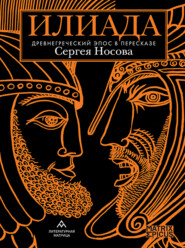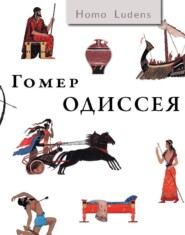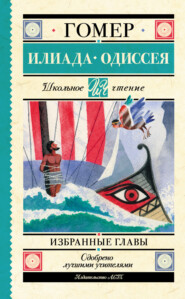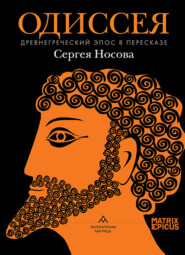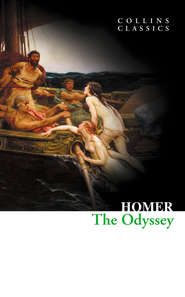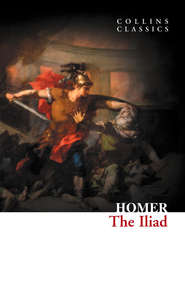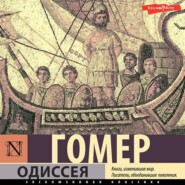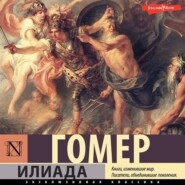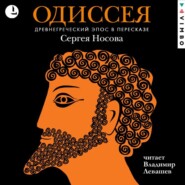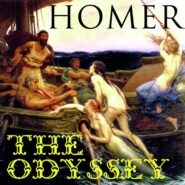По всем вопросам обращайтесь на: info@litportal.ru
(©) 2003-2024.
✖
The Iliad
Настройки чтения
Размер шрифта
Высота строк
Поля
BOOK XX
So by the beaked ships around thee, son of Peleus, hungry for war, the Achaians armed; and over against them the men of Troy, upon the high ground of the plain.
But Zeus bade Themis call the gods to council from many-folded Olympus' brow; and she ranged all about and bade them to the house of Zeus. There was no River came not up, save only Ocean, nor any nymph, of all that haunt fair thickets and springs of rivers and grassy water-meadows. And they came to the house of Zeus who gathereth the clouds, and sat them down in the polished colonnades which Hephaistos in the cunning of his heart had wrought for father Zeus.
Thus gathered they within the doors of Zeus; nor was the Earthshaker heedless of the goddess' call, but from the salt sea came up after the rest, and set him in the midst, and inquired concerning the purpose of Zeus: "Wherefore, O Lord of the bright lightning, hast thou called the gods again to council? Say, ponderest thou somewhat concerning the Trojans and Achaians? for lo, the war and the fighting of them are kindled very nigh."
And Zeus, who gathered the clouds, answered him, saying: "Thou knowest, O Earthshaker, the purpose within my breast, wherefor I gathered you hither; even in their perishing have I regard unto them. But for me I will abide here, sitting within a fold of Olympus, where I will gladden my heart with gazing; but go all ye forth that ye come among the Trojans and Achaians and succour these or those, howsoever each of you hath a mind. For if Achilles alone shall fight against the Trojans, not even a little while shall they hold back the son of Peleus, the fleet of foot. Nay, but even aforetime they trembled when they looked upon him; now therefore that his wrath for his friend is waxen terrible I fear me lest he overleap the bound of fate, and storm the wall."
Thus spake the son of Kronos, and roused unabating war. For on this side and on that the gods went forth to war: to the company of the ships went Hera, and Pallas Athene, and Poseidon, Earth-enfolder, and the Helper Hermes, pro-eminent in subtle thoughts; and with these went Hephaistos in the greatness of his strength, halting, but his shrunk legs moved nimbly under him: but to the Trojans went Ares of the glancing helm, and with him Phoebus of the unshorn hair, and archer Artemis, and Leto and Xanthos and laughter-loving Aphrodite.
Now for so long as gods were afar from mortal men, so long waxed the Achaians glorious, for that Achilles was come forth among them, and his long ceasing from grim battle was at an end. And the Trojans were smitten with sore trembling in the limbs of every one of them, in terror when they beheld the son of Peleus, fleet of foot, blazing in his arms, peer of man-slaying Ares. But when among the mellay of men the Olympians were come down, then leapt up in her might Strife, rouser of hosts, then sent forth Athene a cry, now standing by the hollowed trench without the wall, and now on the echoing shores she shouted aloud. And a shout uttered Ares against her, terrible as the blackness of the storm, now from the height of the city to the Trojans calling clear, or again along Simois shore over Kallikolon he sped.
So urged the blessed gods both hosts to battle, then themselves burst into fierce war. And terribly thundered the father of gods and men from heaven above; and from beneath Poseidon made the vast earth shake and the steep mountain tops. Then trembled all the spurs of many-fountained Ida, and all her crests, and the city of the Trojans, and the ships of the Achaians. And the Lord of the Underworld, Aiedoneus, had terror in hell, and leapt from his throne in that terror and cried aloud, lest the world be cloven above him by Poseidon, Shaker of earth, and his dwelling-place be laid bare to mortals and immortals – grim halls, and vast, and lothly to the gods. So loud the roar rose of that battle of gods. For against King Poseidon stood Phoebus Apollo with his winged arrows, and against Enyalios stood Athene, bright-eyed goddess, and against Hera she of the golden shafts and echoing chase, even archer Artemis, sister of the Far-darter; and against Leto the strong Helper Hermes, and against Hephaistos the great deep-eddying River, whom gods call Xanthos and men Skamandros.
Thus gods with gods were matched. Meanwhile Achilles yearned above all to meet Hector, son of Priam, in the fray; for with that blood chiefliest his spirit bade him sate Ares, stubborn lord of war. But straightway Apollo, rouser of hosts, moved Aineias to go to meet the son of Peleus, and filled him with brave spirit: and he made his own voice like the voice of Lykaon the son of Priam; in his semblance spake Apollo, son of Zeus: "Aineias, counsellor of Trojans, where now are thy threats wherewith thou didst boast to the Trojan lords over thy wine, saying thou wouldest stand up in battle against Achilles, Peleus' son?"
And to him Aineias answered and said: "Son of Priam, why biddest thou me thus face the fierce son of Peleus in battle, though I be not fain thereto? Not for the first time now shall I match me with Achilles, fleet of foot; once before drave he me with his spear from Ida, when he harried our kine and wasted Lyrnessos and Pedasos; but Zeus delivered me out of his hand and put strength into my knees that they were swift. Else had I fallen beneath the hands of Achilles, and of Athene who went before and gave him light, and urged him to slay Leleges and Trojans with his spear of bronze. Therefore it is impossible for man to face Achilles in fight, for that ever some god is at his side to ward off death. Ay, and at any time his spear flieth straight, neither ceaseth till it have pierced through flesh of man. But if God once give us fair field of battle, not lightly shall he overcome me, not though he boast him made of bronze throughout."
And to him in answer spake Apollo son of Zeus: "Yea, hero, pray thou too to the everliving gods; for thou too, men say, wast born of Aphrodite daughter of Zeus, and Achilles' mother is of less degree among the gods. For thy mother is child of Zeus, his but of the Ancient One of the Sea. Come, bear up thy unwearying spear against him, let him no wise turn thee back with revilings and bitter words."
He said, and breathed high spirit into the shepherd of the host, and he went onward through the forefront of the fighting, harnessed in flashing bronze. But white-armed Hera failed not to discern Anchises' son as he went through the press of men to meet the son of Peleus, and gathering the gods about her she spake among them thus: "Consider ye twain, Poseidon and Athene, within your hearts, what shall come of these things that are done. Here is Aineias gone forth harnessed in flashing bronze, to meet the son of Peleus, and it is Phoebus Apollo that hath sent him. Come then, be it ours to turn him back straightway; or else let some one of us stand likewise beside Achilles and give him mighty power, so that he fail not in his spirit, but know that they who love him are the best of the Immortals, and that they who from of old ward war and fighting from the Trojans are vain as wind. All we from Olympus are come down to mingle in this fight that he take no hurt among the Trojans on this day – afterward he shall suffer whatsoever things Fate span for him with her thread, at his beginning, when his mother bare him. If Achilles learn not this from voice divine, then shall he be afraid when some god shall come against him in the battle; for gods revealed are hard to look upon."
Then to her made answer Poseidon, Shaker of the earth: "Hera, be not fierce beyond wisdom; it behoveth thee not. Not fain am I at least to match gods with gods in strife. Let us go now into some high place apart and seat us there to watch, and battle shall be left to men. Only if Ares or Phoebus Apollo fall to fighting, or put constraint upon Achilles and hinder him from fight, then straightway among us too shall go up the battle-cry of strife; right soon, methinks, shall they hie them from the issue of the fray back to Olympus to the company of the gods, overcome by the force of our hands."
Thus spake the blue-haired god, and led the way to the mounded wall of heaven-sprung Herakles, that lofty wall built him by the Trojans and Pallas Athene, that he might escape the monster and be safe from him, what time he should make his onset from the beach to the plain. There sate them down Poseidon and the other gods, and clothed their shoulders with impenetrable cloud. And they of the other part sat down on the brows of Kallikolon around thee, Archer Phoebus, and Ares waster of cities. Thus they on either side sat devising counsels, but shrank all from falling to grievous war, and Zeus from his high seat commanded them.
Meanwhile the whole plain was filled with men and horses and ablaze with bronze; and the earth rang with the feet of them as they rushed together in the fray. Two men far better than the rest were meeting in the midst between the hosts, eager for battle, Aineias, Anchises' son, and noble Achilles. First came on Aineias threateningly, tossing his strong helm; his rapid shield he held before his breast, and brandished his bronze spear. And on the other side the son of Peleus rushed to meet him like a lion, a ravaging lion whom men desire to slay, a whole tribe assembled: and first he goeth his way unheeding, but when some warrior youth hath smitten him with a spear, the he gathereth himself open-mouthed, and foam cometh forth about his teeth, and his stout spirit groaneth in his heart, and with his tail he scourgeth either side his ribs and flanks and goadeth himself on to fight, and glaring is borne straight on them by his passion, to try whether he shall slay some man of them, or whether himself shall perish in the forefront of the throng: thus was Achilles driven of his passion and valiant spirit to go forth to meet Aineias great of heart. And when they were come near against each other, then first to Aineias spake fleet-footed noble Achilles: "Aineias, wherefore hast thou so far come forward from the crowd to stand against me: doth thy heart bid thee fight with me in hope of holding Priam's honour and lordship among the horse-taming Trojans? Nay, though thou slay me, not for that will Priam lay his kingdom in thy hands, for he hath sons, and is sound and of unshaken mind. Or have the Trojans allotted thee some lot of ground more choice than all the rest, fair land of tilth and orchard, that thou mayest dwell therein, if thou slay me? But methinks thou wilt find the slaying hard; for once before, I ween, have I made thee flee before my spear. Host thou forgotten the day when thou wert alone with the kine, and I made thee run swift-footed down Ida's steeps in haste? – then didst thou not look behind thee in thy flight. Thence fleddest thou to Lernessos, but I wasted it, having fought against it with the help of Athene and of father Zeus, and carried away women captive, bereaving them of their day of freedom: only thee Zeus shielded, and other gods. But not this time, methinks, shall they shield thee, as thou imaginest in thy heart: therefore I bid thee go back into the throng and come not forth against me, while as yet thou art unhurt – after the event even a fool is wise."
Then to him in answer again Aineias spake: "Son of Peleus, think not with words to affright me as a child, since I too well know myself how to speak taunts and unjust speech. We know each other's race and lineage in that we have heard the fame proclaimed by mortal men, but never hast thou set eyes on my parents, or I on thine. Thou, they say, art son of nobie Peleus, and of Thetis of the fair tresses, the daughter of the sea: the sire I boast is Anchises great of heart, and my mother is Aphrodite. Of these shall one pair or the other mourn their dear son today; for verily not with idle words shall we two satisfy our strife and depart out of the battle. But, if thou wilt, learn also this, that thou mayest well know our lineage, known to full many men: First Zeus the cloud-gatherer begat Dardanos, and he stablished Dardania, for not yet was holy Ilios built upon the plain to be a city of mortal men, but still they dwelt on slopes of many-fountained Ida. Then Dardanos begat a son, king Erichthonios, who became richest of mortal men. Three thousand mares had he that pastured along the marsh meadow, rejoicing in their tender foals. Of them was Boreas enamoured as they grazed, and in semblance of a dark-maned horse he covered them: then they having conceived bare twelve fillies. These when they bounded over Earth the grain-giver would run upon the topmost ripened ears of corn and break them not; and when they bounded over the broad backs of the sea they would run upon the crests of the breakers of the hoary brine. Then Erichthonios begat Tros to be load over the Trojans, and to Tros three noble sons were born, Ilos and Assarakos and godlike Ganymedes, who became the most beautiful of mortal men. Him the gods caught up to be cupbearer to Zeus, for sake of his beauty, that he might dwell among immortals. Then Ilos again begat a son, noble Laomedon, and Laomedon begat Tithonos and Priam and Lamppos and Klytios and Hiketaon, of the stock of Ares. And Assarakos begat Kapys, and Kapys Anchises, and Anchises me; but Priam begat the goodly Hector.
"Lo then of this blood and lineage declare I myself unto thee. But for valour, Zeus increaseth it in men or minisheth it according as he will, for he is lord of all. But come, let us talk thus together no longer like children, standing in mid onset of war. For there are revilings in plenty for both of us to utter – a hundred-thwarted ship would not suffice for the load of them. Glib is the tongue of man, and many words are therein of every kind, and wide is the range of his speech hither and thither. Whatsoever word thou speak, such wilt thou hear in answer. But what need that we should bandy strife and wrangling each against each. Not by speech shalt thou turn me from the battle that I desire, until we have fought together, point to point: come then, and straightway we will each try the other with bronze-headed spears."
He said, and against that other's dread and mighty shield hurled his great spear, and the shield rang loud beneath the spear-point. And the son of Peleus held away the shield from him with his stout hand, in fear, for he thought that the far-shadowing spear of Aineias great of heart would lightly pierce it through – fond man, and knew not in his mind and heart that not lightly do the glorious gifts of gods yield to force of mortal men. So did not the great spear of wise Aineias pierce that shield, for the gold resisted it, even the gift of the god. Yet through two folds he drave it, but three remained, for five folds had the lame god welded, two bronze, and two inside of tin, and one of gold; therein was stayed the ashen spear.
Then Achilles in his turn hurled his far-shadowing spear, and smote upon the circle of the shield of Aineias, beneath the edge of the rim, where the bronze ran thinnest round, and the bull-hide was thinnest thereon; and right through sped the Pelian ashen spear, and the shield cracked under it. And Aineias crouched and held up the shield away from him in dread; and the spear flew over his back and fixed itself in the earth, having divided asunder the two circles of the sheltering shield. And having escaped the long spear he stood still, and a vast anguish drowned his eyes, affrighted that the spear was planted by him so nigh. But Achilles drew his sharp sword and furiously made at him, crying his terrible cry: then Aineias grasped in his hand a stone (a mighty deed) such as two men, as men now are, would not avail to lift, but he with ease wielded it all alone. Then would Aineias have smitten him with the stone as he charged, either on helm or shield, which had warded from him bitter death, and then would the son of Peleus have closed and slain him with his sword, had not Poseidon, Shaker of earth, marked it with speed, and straightway spoken among the immortal gods: "Alas, woe is me for Aineias great of heart, who quickly will go down to Hades slain by the son of Peleus, for that he will obey the words of Apollo the far-darter, fond man, but nowise shall the god help him from grievous death. But wherefore now is he to suffer ill in his innocence, causelessly for others' wickedness, yet welcome ever are his offerings to the gods who inhabit the spacious heaven? Come, let us guide him out of death's way, lest the son of Kronos be wroth, if Achilles slay him; for it is appointed to him to escape, that the race of Dardanos perish not without seed or sign, even Dardanos whom the son of Kronos loved above all the children born to him from the daughters of men. For the race of Priam hath Zeus already hated. But thus shall the might of Aineias reign among the Trojans, and his children's children, who shall be born in the aftertime."
And him then answered Hera the ox-eyed queen: "Shaker of earth, thyself with thine own mind take counsel, whether thou wilt save Aineias, or leave him [to be slain, brave though he be, by Achilles, Peleus' son]. For by many oaths among all the Immortals have we two sworn, even Pallas Athene and I, never to help the Trojans from their evil day, not even when all Troy shall burn in the burning of fierce fire, and they that burn her shall be the warlike sons of the Achaians."
Now when Poseidon Shaker of earth heard that, he went up amid the battle and the clash of spears, and came where Aineias and renowned Achilles were. Then presently he shed mist over the eyes of Achilles, Peleus' son, and drew the bronze-headed ashen spear from the shield of Aineias great of heart, and set it before Achilles' feet, and lifted Aineias and swung him high from off the earth. Over many ranks of warriors, of horses many, sprang Aineias soaring in the hand of the god, and lighted at the farthest verge of the battle of many onsets, where the Kaukones were arraying them for the fight. Then hard beside him came Poseidon, Shaker of earth, and spake aloud to him winged words: "Aineias, what god is it that biddeth thee fight infatuate against Peleus' vehement son, who is both a better man than thou and dearer to Immortals? Rather withdraw thee whensoever thou fallest in with him, lest even contrary to thy fate thou enter the house of Hades. But when Achilles shall have met his death and doom, then be thou of good courage to fight among the foremost, for there shall none other of the Achaians slay thee."
He spoke, and left him there, when he had shown him all these things. Then quickly from Achilles' eyes he purged the magic mist; and he stared with wide eyes, and in trouble spake unto his proud soul: "Ha! verily a great marvel behold I here with mine eyes. My spear lieth here upon the ground, nor can I anywise see the man at whom I hurled it with intent to slay him. Truly then is Aineias likewise dear to the immortal gods, howbeit I deemed that his boosting thereof was altogether vanity. Away with him! not again will he find heart to make trial of me, now that once more he has escaped death to his joy. But come, I will call on the warlike Danaans and go forth to make trial of some other Trojan face to face."
He said, and leapt along the lines, and called upon each man: "No longer stand afar from the men of Troy, noble Achaians, but come let man match man and throw his soul into the fight. Hard is it for me, though I be strong, to assail so vast a folk and fight them all: not even Ares, though an immortal god, nor Athene, could plunge into the jaws of such a fray and toil therein. But to my utmost power with hands and feet and strength no whit, I say, will I be slack, nay, never so little, but right through their line will I go forward, nor deem I that any Trojan shall be glad who shall come nigh my spear."
Thus spake he urging them. But to the Trojans glorious Hector called aloud, and proclaimed that he would go forth against Achilles: "High-hearted Trojans, fear not Peleus' son. I too in words could fight even Immortals, but with the spear it were hard, for they are stronger far. Neither shall Achilles accomplish all his talk, but part thereof he is to accomplish, and part to break asunder in the midst. And against him will I go forth, though the hands of him be even as fire, yea though his hands be as fire and his fierceness as the flaming steel."
Thus spake he urging them, and the Trojans raised their spears for battle; and their fierceness was mingled confusedly, and the battle-cry arose. Then Phoebus Apollo stood by Hector and spake to him: "Hector, no longer challenge Achilles at all before the lines, but in the throng await him and from amid the roar of the battle, lest haply he spear thee or come near and smite thee with his sword."
Thus spake he, and Hector again fell back into the crowd of men, for he was amazed when he heard the sound of a god's voice.
But Achilles sprang in among the Trojans, his heart clothed with strength, crying his terrible cry, and first he took Iphition, Otrynteus' valiant son, a leader of much people, born of a Naiad nymph to Otrynteus waster of cities, beneath snowy Tmolos, in Hyde's rich domain. Him as he came right on did goodly Achilles smite with his hurled spear, down through the midst of his head, and it was rent asunder utterly. And he fell with a crash, and goodly Achilles exulted over him; "here is thy death, thy birth was on the Gygaian lake, where is thy sire's demesne, by Hyllos rich in fish and eddying Hermos."
Thus spake he exultant, but darkness fell upon the eyes of Iphition: him the chariots of the Achaians clave with their tires asunder in the forefront of the battle, and over him Achilles pierced in the temples, through his bronze-cheeked helmet, Demoleon, brave stemmer of battle, Antenor's son. No stop made the bronze helmet, but therethrough sped the spear-head and clave the bone, and the brain within was all scattered: that stroke made ending of his zeal. Then Hippodamas, as he leapt from his chariot and fled before him, Achilles wounded in the back with his spear: and he breathed forth his spirit with a roar, as when a dragged bull roareth that the young men drag to the altar of the Lord of Helike; for in such hath the Earthshaker his delight: thus roared Hippodamas as from his bones fled forth his haughty spirit. But Achilles with his spear went on after godlike Polydoros, Priam's son. Him would his sire continually forbid to fight, for that among his children he was youngest born and best beloved, and overcame all in fleetness of foot. Just then in boyish folly, displaying the swiftness of his feet, he was rushing through the forefighters, until he lost his life. Him in the midst did fleet-footed noble Achilles smite with a javelin, in his back as he darted by, where his belt's golden buckles clasped, and the breast and back plates overlapped: and right through beside the navel went the spear-head, and he fell on his knee with a cry, and dark cloud covered him round about, and he clasped his bowels to him with his hands as he sank.
Then when Hector saw his brother Polydoros clasping his bowels with his hands, and sinking to the earth, a mist fell over his eyes, nor longer might he endure to range so far apart, but he came up against Achilles brandishing his sharp spear, and like flame of fire. And Achilles when he saw him, sprang up, and spake exultingly: "Behold the man who hath deepest stricken into my soul, who slew my dear-prized friend; not long shall we now shrink from each other along the highways of the war."
He said, and looking grimly spake unto goodly Hector: "Come thou near, that the sooner thou mayest arrive at the goal of death."
Then to him, unterrified, said Hector of the glancing helm: "Son of Peleus, think not with words to affright me as a child, since I too know myself how to speak taunts and unjust speech. And I know that thou art a man of might, and a far better man than I. Yet doth this issue lie in the lap of the gods, whether I though weaker shall take thy life with my hurled spear, for mine too hath been found keen ere now."
He said, and poised his spear and hurled it, and Athene with a breath turned it back from glorious Achilles, breathing very lightly; and it came back to goodly Hector, and fell there before his feet. Then Achilles set fiercely upon him, eager to slay him, crying his terrible cry. But Apollo caught Hector up, very easily, as a god may, and hid him in thick mist. Thrice then did fleet-footed noble Achilles make onset with his spear of bronze, and thrice smote the thick mist. [But when the fourth time he had come godlike on,] then with dread shout he spake to him winged words: "Dog, thou art now again escaped from death; yet came ill very nigh thee; but now hath Phoebus Apollo saved thee, to whom thou must surely pray when thou goest forth amid the clash of spears. Verily I will slay thee yet when I meet thee hereafter, if any god is helper of me too. Now will I make after the rest, whomsoever I may seize."
Thus speaking he pierced Dryops in the midst of his neck with his spear, and he fell down before his feet. But he left him where he lay, and hurled at Demuchos Philetor's son, a good man and a tall, and stayed him with a stroke upon his knees; then smote him with his mighty sword and reft him of life. Then springing on Laogonos and Dardanos, sons of Bias, he thrust both from their chariot to the ground, one with a spear-cast smiting and the other in close battle with his sword. Then Tros, Alastor's son – he came and clasped his knees to pray him to spare him, and let him live, and slay him not, having compassion on his like age, fond fool, and knew not that he might not gain his prayers; for nowise soft of heart or tender was that man, but of fierce mood – with his hands he touched Achilles' knees, eager to entreat him, but he smote him in the liver with his sword, and his liver fell from him, and black blood therefrom filled his bosom, and he swooned, and darkness covered his eyes. Then Achilles came near and struck Mulios in the ear, and right through the other ear went the bronze spear-head. Then he smote Agenor's son Echeklos on the midst of the head with his hilted sword, and all the sword grew hot thereat with blood; and dark death seized his eyes, and forceful fate. Then next Deukalion, just where the sinews of the elbow join, there pierced he him through the forearm with his bronze spear-head; so abode he with his arm weighed down, beholding death before him; and Achilles smiting the neck with his sword swept far both head and helm, and the marrow rose out of the backbone, and the corpse lay stretched upon the earth. Then went he onward after Peires' noble son, Rhigmos, who had come from deep-soiled Thrace: him in the midst he smote with his hurled javelin, and the point fixed in his lung, and he fell forth of his chariot. And Areithoos his squire, as he turned the horses round, he pierced in the back with his sharp spear, and thrust him from the car, and the horse ran wild with fear.
As through deep glens rageth fierce fire on some parched mountain-side, and the deep forest burneth, and the wind driving it whirleth every way the flame, so raged he every way with his spear, as it had been a god, pressing hard on the men he slew; and the black earth ran with blood. For even as when one yoketh wide-browed bulls to tread white barley in a stablished threshing-floor, and quickly is it trodden out beneath the feet of the loud-lowing bulls, thus beneath great-hearted Achilles his whole-hooved horses trampled corpses and shields together; and with blood all the axletree below was sprinkled and the rims that ran around the car, for blood-drops from the horses' hooves splashed them, and blood-drops from the tires of the wheels. But the son of Peleus pressed on to win him glory, flecking with gore his irresistible hands.
BOOK XXI
But when now they came unto the ford of the fair-flowing river, even eddying Xanthos, whom immortal Zeus begat, there sundering them he chased the one part to the plain toward the city, even where the Achaians were flying in affright the day before, when glorious Hector was in his fury – thither poured some in flight, and Hera spread before them thick mist to hinder them: – but half were pent into the deep-flowing silver eddied river, and fell therein with a mighty noise, and the steep channel sounded, and the banks around rang loudly; for with shouting they swam therein hither and thither whirled round the eddies. And as when at the rush of fire locusts take wing to fly unto a river, and the unwearying fire flameth forth on them with sudden onset, and they huddle in the water; so before Achilles was the stream of deep-eddying Xanthos filled with the roar and the throng of horses and men.
Then the seed of Zeus left behind him his spear upon the bank, leant against tamarisk bushes, and leapt in, as it were a god, keeping his sword alone, and devised grim work at heart, and smote as he turned him every way about: and their groaning went up ghastly as they were stricken by the sword, and the water reddened with blood. As before a dolphin of huge maw fly other fish and fill the nooks of some fair-havened bay, in terror, for he devoureth amain whichsoever of them he may catch; so along the channels of that dread stream the Trojans crouched beneath the precipitous sides. And when his hands were weary of slaughter he chose twelve young men alive out of the river, an atonement for Patroklos, Menoitios' son that was dead. These brought he forth amazed like fawns, and bound behind them their hands with well-cut thongs, which they themselves wore on their pliant doublets, and gave them to his comrades to lead down to the hollow ships. Then again he made his onset, athirst for slaying.
There met he a son of Dardanid Priam, in flight out of the river, Lykaon, whom once himself he took and brought unwilling out of his father's orchard, in a night assault; he was cutting with keen bronze young shoots of a wild fig tree, to be hand-rails of a chariot; but to him an unlooked-for bane came goodly Achilles. And at that time he sold him into well-peopled Lemnos, sending him on ship board, and the son of Jason gave a price for him; and thence a guest friend freed him with a great ransom, Eetion of Imbros, and sent him to goodly Arisbe; whence flying secretly he came to his father's house. Eleven days he rejoiced among his friends after he was come from Lemnos, but on the twelfth once more God brought him into the hands of Achilles, who was to send him to the house of Hades though nowise fain to go. Him when fleet-footed noble Achilles saw bare of helm and shield, neither had he a spear, but had thrown all to the ground; for he sweated grievously as he tried to flee out of the river, and his knees were failing him for weariness: then in wrath spake Achilles to his great heart: "Ha! verily great marvel is this that I behold with my eyes. Surely then will the proud Trojans whom I have slain rise up again from beneath the murky gloom, since thus hath this man come back escaped from his pitiless fate, though sold into goodly Lemnos, neither hath the deep of the hoary sea stayed him, that holdeth many against their will. But come then, of our spear's point shall he taste, that I may see and learn in my mind whether likewise he shall come back even from beneath, or whether the life-giving Earth shall hold him down, she that holdeth so even the strong."
Thus pondered he in his place; but the other came near amazed, fain to touch his knees, for his soul longed exceedingly to flee from evil death and black destruction. Then goodly Achilles lifted his long spear with intent to smite him, but he stooped and ran under it and caught his knees; and the spear went over his back and stood in the ground, hungering for flesh of men. Then Lykaon besought him, with one hand holding his knees, while with the other he held the sharp spear and loosed it not, and spake to him winged words: "I cry thee mercy, Achilles; have thou regard and pity for me: to thee, O fosterling of Zeus, am I in the bonds of suppliantship. For at thy table first I tasted meal of Demeter on the day when thou didst take me captive in the well-ordered orchard, and didst sell me away from my father and my friends unto goodly Lemnos, and I fetched thee the price of a hundred oxen. And now have I been ransomed for thrice that, and this is my twelfth morn since I came to Ilios after much pain. Now once again hath ruinous fate delivered me unto thy hands; surely I must be hated of father Zeus, that he hath given me a second time unto thee; and to short life my mother bare me, Laothoe, old Altes' daughter – Altes who ruleth among the war-loving Leleges, holding steep Pedasos on the Satnioeis. His daughter Priam had to wife, with many others, and of her were we two born, and thou wilt butcher both. Him among the foremost of the foot-soldiers didst thou lay low, even godlike Polydoros, when thou smotest him with they sharp spear: and now will it go hard with me here, for no hope have I to escape thy hands, since God hath delivered me thereunto. Yet one thing will I tell thee, and do thou lay it to heart: slay me not, since I am not of the same mother as Hector, who slew thy comrade the gentle and brave."
Thus spake to him the noble son of Priam, beseeching him with words, but he heard a voice implacable: "Fond fool, proffer me no ransom, nor these words. Until Patroklos met his fated day, then was it welcomer to my soul to spare the men of Troy, and many I took alive and sold beyond the sea: but now there is none shall escape death, whomsoever before Ilios God shall deliver into my hands – yes, even among all Trojans, but chiefest among Priam's sons. Ay, friend, thou too must die: why lamentest thou? Patroklos is dead, who was better far than thou. Seest thou not also what manner of man am I for might and goodliness? and a good man was my father, and a goddess mother bare me. Yet over me too hang death and forceful fate. There cometh morn or eve or some noonday when my life too some man shall take in battle, whether with spear he smite or arrow from the string."
Thus spake he, and the other's knees and heart were unstrung. He let go Achilles' spear, and sat with both hands outspread. But Achilles drew his sharp sword and smote on the collar-bone beside the neck, and all the two-edged sword sank into him, and he lay stretched prone upon the earth, and blood flowed dark from him and soaked the earth. Him seized Achilles by the foot and sent him down the stream, and over him exulting spake winged words: "There lie thou among the fishes, which shall lick off thy wound's blood heedlessly, nor shall thy mother lay thee on a bed and mourn for thee, but Skamandros shall bear thee on his eddies into the broad bosom of the sea. Leaping along the wave shall many a fish dart up to the dark ripple to eat of the white flesh of Lykaon. So perish all, until we reach the citadel of sacred Ilios, ye flying and I behind destroying. Nor even the River, fair-flowing, silver-eddied, shall avail you, to whom long time forsooth ye sacrifice many bulls, and among his eddies throw whole-hooved horses down alive. For all this yet shall ye die the death, until ye pay all for Patroklos' slaying and the slaughter of Achaians whom at the swift ships ye slew while I tarried afar."
Thus spake he, but the River waxed ever more wroth in his heart, and sought in his soul how he should stay goodly Achilles from his work, and ward destruction from the Trojans. Meanwhile the son of Peleus with his far-shadowing spear leapt, fain to slay him, upon Asteropaios son of Pelegon, whom wide-flowing Axios begat of Periboia eldest of the daughters of Akessamenos. Upon him set Achilles, and Asteropaios stood against him from the river, holding two spears; for Xanthos put courage into his heart, being angered for the slaughtered youths whom Achilles was slaughtering along the stream and had no pity on them. Then when the twain were come nigh in onset on each other, unto him first spake fleet-footed noble Achilles: "Who and whence art thou of men, that darest to come against me? Ill-fated are they whose children match them with my might."
And to him, made answer Pelegon's noble son: "High-hearted son of Peleus, why askest thou my lineage? I come from deep-soiled Paionia, a land far off, leading Paionian men with their long spears, and this now is the eleventh morn since I am come to Ilios. My lineage is of wide-flowing Axios, who begat Pelegon famous with the spear, and he, men say, was my father. Now fight we, noble Achilles!"
Thus spake he in defiance, and goodly Achilles lifted the Pelian ash: but the warrior Asteropaios hurled with both spears together, for he could use both hands alike, and with the one spear smote the shield, but pierced it not right through, for the gold stayed it, the gift of a god; and with the other he grazed the elbow of Achilles' right arm, and there leapt forth dark blood, but the point beyond him fixed itself in the earth, eager to batten on flesh. Then in his turn Achilles hurled on Asteropaios his straight-flying ash, fain to have slain him, but missed the man and struck the high bank, and quivering half its length in the bank he left the ashen spear. Then the son of Peleus drew his sharp sword from his thigh and leapt fiercely at him, and he availed not to draw with his stout hand Achilles' ashen shaft from the steep bank. Thrice shook he it striving to draw it forth, and thrice gave up the strain, but the fourth time he was fain to bend and break the ashen spear of the seed of Aiakos, but ere that Achilles closing on him reft him of life with his sword. For in the belly he smote him beside the navel, and all his bowels gushed out to the earth, and darkness covered his eyes as he lay gasping. Then Achilles trampling on his breast stripped off his armour and spake exultingly: "Lie there! It is hard to strive against children of Kronos' mighty son, even though one be sprung from a River-god. Thou truly declarest thyself the seed of a wide-flowing River, but I avow me of the linkage of great Zeus. My sire is a man ruling many Myrmidons, Peleus the son of Aiakos, and Aiakos was begotten of Zeus. As Zeus is mightier than seaward-murmuring rivers, so is the seed of Zeus made mightier than the seed of a river. Nay, there is hard beside thee a great river, if he may anywise avail; but against Zeus the son of Kronos it is not possible to fight. For him not even king Acheloios is match, nor yet the great strength of deep-flowing Ocean, from whom all rivers flow and every sea, and all springs and deep wells: yea, even he hath fear of the lightning of great Zeus and his dread thunder, when it pealeth out of heaven."
He said, and from the steep bank drew his bronze spear, and left there Asteropaios whom he had slain, lying in the sands, and the dark water flooded him. Around him eels and fishes swarmed, tearing and gnawing the fat about his kidneys. But Achilles went on after the charioted Paiones who still along the eddying river huddled in fear, when they saw their best man in the stress of battle slain violently by the hands and the sword of the son of Peleus. There slew he Thersilochos and Mydon and Astypylos and Mnesos and Thrasios and Ainios and Ophelestes; and more yet of the Paiones would swift Achilles have slain, had not the deep-eddying River called unto him in wrath, in semblance of a man, and from an eddy's depth sent forth a voice: "O Achilles, thy might and thy evil work are beyond the measure of men; for gods themselves are ever helping thee. If indeed the son of Kronos hath delivered thee all the Trojans to destroy, at least drive them forth from me and do thy grim deeds on the plain, for filled with dead men is my pleasant bed, nor can I pour my stream to the great sea, being choked with dead, and thou slayest ruthlessly. Come then, let be; I am astonished, O captain of hosts."
And to him answered Achilles fleet of foot: "So be it, heaven-sprung Skamandros, even as thou biddest. But the proud Trojans I will not cease from slaying until I have driven them into their city, and have made trial with Hector face to face whether he is to vanquish me or I him."
Thus saying, he set upon the Trojans, like a god. Then unto Apollo spake the deep-eddying River: "Out on it, lord of the silver bow, child of Zeus, thou hast not kept the ordinance of Kronos' son, who charged thee straitly to stand by the Trojans and to help them, until eve come with light late-setting, and darken the deep-soiled earth."
He said, and spear-famed Achilles sprang from the bank and leapt into his midst; but he rushed on him in a furious wave, and stirred up all his streams in tumult, and swept down the many dead who lay thick in him, slain by Achilles; these out to land he cast with bellowing like a bull, and saved the living under his fair streams, hiding them within eddies deep and wide. But terribly around Achilles arose his tumultuous wave, and the stream smote violently against his shield, nor availed he to stand firm upon his feet. Then he grasped a tall fair-grown elm, and it fell uprooted and tore away all the bank, and reached over the fair river bed with its thick shoots, and stemmed the River himself, falling all within him: and Achilles, struggling out of the eddy, made haste to fly over the plain with his swift feet, for he was afraid. But the great god ceased not, but arose upon him with darkness on his crest, that he might stay noble Achilles from slaughter, and ward destruction from the men of Troy. And the son of Peleus rushed away a spear's throw, with the swoop of a black eagle, the mighty hunter, strongest at once and swiftest of winged birds. Like him he sped, and on his breast the bronze rang terribly as he fled from beneath the onset, and behind him the River rushed on with a mighty roar. As when a field-waterer from a dark spring leadeth water along a bed through crops and garden grounds, a mattock in his hands, casting forth hindrances from the ditch, and as it floweth all pebbles are swept down, and swiftly gliding it murmureth down a sloping place, and outrunneth him that is its guide: – thus ever the river wave caught up Achilles for all his speed; for gods are mightier than men. For whensoever fleet-footed noble Achilles struggled to stand against it, and know whether all immortals be upon him who inhabit spacious heaven, then would a great wave of the heaven-sprung River beat upon his shoulders from above, and he sprang upward with his feet, sore vexed at heart; and the River was wearying his knees with violent rush beneath, devouring the earth from under his feet. Then the son of Peleus cried aloud, looking up to the broad heaven: "Zeus, Father, how doth none of the gods take it on him in pity to save me from the River! after that let come to me what may. None other of the inhabitants of Heaven is chargeable so much, but only my dear mother, who beguiled me with false words, saying that under the wall of the mail-clad men of Troy I must die by the swift arrows of Apollo. Would that Hector had slain me, the best of men bred here: then brave had been the slayer, and a brave man had he slain. But now by a sorry death am I doomed to die, pent in this mighty river, like a swineherd boy whom a torrent sweepeth down as he essayeth to cross it in a storm."
Thus spake he, and quickly Poseidon and Athene came near and stood beside him, in the likeness of men, and taking his hands in theirs pledged him in words. And the first that spake was Poseidon, Shaker of the earth: "Son of Peleus, tremble not, neither be afraid; such helpers of thee are we from the gods, approved of Zeus, even Pallas Athene and I, for to be vanquished of a river is not appointed thee, but he will soon give back, and thou wilt thyself perceive it: but we will give thee wise counsel, if thou wilt obey it; hold not thy hand from hazardous battle until within Ilios' famous walls thou have pent the Trojan host, even all that flee before thee. But do thou, when thou hast taken the life of Hector, go back unto the ships; this glory we give unto thee to win."
They having thus spoken departed to the immortals, but he toward the plain – for the bidding of gods was strong upon him – went onward; and all the plain was filled with water-flood, and many beautiful arms and corpses of slain youths were drifting there. So upward sprang his knees as he rushed against the stream right on, nor stayed him the wide-flowing River, for Athene put great strength in him. Neither did Skamandros slacken his fierceness, but yet more raged against the son of Peleus, and he curled crestwise the billow of his stream, lifting himself on high, and on Simoeis he called with a shout: "Dear brother, the strength of this man let us both join to stay, since quickly he will lay waste the great city of king Priam, and the Trojans abide not in the battle. Help me with speed, and fill thy streams with water from thy springs, and urge on all thy torrents, and raise up a great wave, and stir huge roaring of tree-stumps and stones, that we may stay the fierce man who now is lording it, and deeming himself match for gods. For neither, I ween, will strength avail him nor comeliness anywise, nor that armour beautiful, which deep beneath the flood shall be o'erlaid with slime, and himself I will wrap him in my sands and pour round him countless shingle without stint, nor shall the Achaians know where to gather his bones, so vast a shroud of silt will I heap over them. Where he dieth there shall be his tomb, neither shall he have need of any barrow to be raised, when the Achaians make his funeral."






